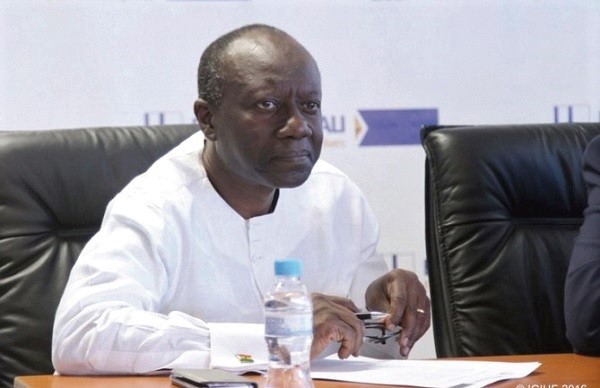
Year of the mask
According to the Chinese calendar, 2020 was supposed to be the Year of the Rat.
Instead, the world ended up with the Year of the Mask, which is suffocating us as we desperately combat a deadly virus that emerged in China in December 2019 and quickly engulfed the globe, sowing death, despair and fear.
It is a year that will live in infamy, but it is also a year that offers an opportunity to unmask structural distortions in development policy that will almost certainly constrain our ability to weather the crisis and begin the business of rebuilding the Ghanaian society and economy.
As of May 17, 2020, the novel coronavirus (so named because there are others less deadly) had infected about 4.8 million people worldwide, with 313,000 deaths; nearly two million had recovered from COVID-19, the disease caused by the virus.
The US, which at the onset felt so impervious to the virus that it even assisted China with 17 tons of medical supplies, including masks and respirators, had the highest number of infections, 1.5 million, and deaths, about 90,000, in the world.
China, which pioneered lockdowns to slow the virus, had about 83,000 infections and 4,633 deaths.
Economies
Besides the human cost, the crisis has also battered economies. The International Monetary Fund (IMF), which in October 2019 projected global economic growth of 3.4 per cent in 2020, now expects a decline of 3.0 per cent, with commodity prices plunging by 42.0 per cent and international trade falling by 11.0 per cent.
Sub-Saharan Africa’s economy is projected to contract by 1.6 per cent, down from an October forecast of a 3.6 per cent expansion.
The fund, however, sees Ghana’s growth slowing from its October 2019 forecast of 5.6 per cent to 1.5 per cent in 2020.
This, of course, will depend on a number of factors, notably the duration of the crisis globally and locally, as well as the credibility and efficacy of government policies to heal a traumatised society and jump-start a crippled economy.
The external, of course, is beyond our control but there is plenty we can do within our control.
Ideally, we need an initial relief phase, followed by a growth phase, with direct financial support for households and businesses distressed by the crisis.
Some foreign governments, for example, are giving households and small businesses cash to help sustain consumer spending and minimise the economic fallout for those businesses.
In Ghana, consumer spending makes up as much as 70 per cent of GDP, and is thus a major driver of growth.
Cash transfers can certainly help, but the chaotic attempt to feed people during the lockdown left an unfavourable impression of government’s ability to handle any such cash outs — that is, if it has the cash, which it doesn’t. That rules out this option.
The anticipated decline in both international and domestic remittances also means that, in addition to the depressive effects of business slowdown and rising unemployment, household incomes will fall significantly this year.
The sum effect of all this, based on recent trends, is a likely fall in consumer spending of up to 5.0 per cent or more, depending on how long the crisis lingers on.
Business spending, another key growth driver, is also at risk. There is talk of a ‘stimulus package’, but here too doubts arise.
Some of the beneficiaries of a similar package in the past to support ‘viable but distressed firms’ used their money to buy real estate in London instead.
This means that the latest package must have robust safeguards, including the publication of all beneficiaries to prevent fraud and waste.
Alternative
An alternative strategy that is less amenable to abuse and likely to have the broadest impact is to improve general business conditions through innovative policies and reforms.
The Bank of Ghana (BoG) has taken the lead by moving beyond its policy rate and deploying a number of quantitative tools to encourage commercial banks to lend more to businesses.
To be fully effective, however, this initiative should be complemented with other measures such as outlawing predatory lending practices (including the fixed-balance method for loans) that impoverish borrowers, increase risks of default and, ultimately, inhibit the ability of SMEs, in particular, to expand and create jobs.
Fiscal policy remains the weakest link, plagued, as it is, by years of structural contradictions that prioritise wasteful consumption over growth-inducing spending.
For example, between 2008 and 2019 (the period with the most consistent data), the government’s wage bill exceeded budget every year by an average 8.9 per cent, even as domestic revenue fell short of target in nine of the 12 years on average by 5.0 per cent annually.
Invariably, critical spending for infrastructure was drastically cut to accommodate the endemic profligacy.
Disbursements from the District Assemblies Common Fund (DACF), critical to growing local economies and by extension, the national economy, were slashed by an annual average of about 30.0 per cent, while domestic capital spending was reduced on average by 12.0 per cent per year.
Cycle
The overall effect has been a vicious cycle of low investment, low growth, low revenue and further low investment, as public sector wages, bearing no discernible relationship to productivity continually strain the fiscus.
The scourge of corruption and waste only worsens matters.
Unless we tackle these policy ills head on in the Year of the Mask, our ability to save more lives and restore livelihoods in the midst of the COVID-19 crisis will be greatly diminished, and we may end the year with the first negative growth in nearly 40 years.
It would be a costly setback to our national development agenda with dire consequences for social stability and future growth. We don’t want that.
